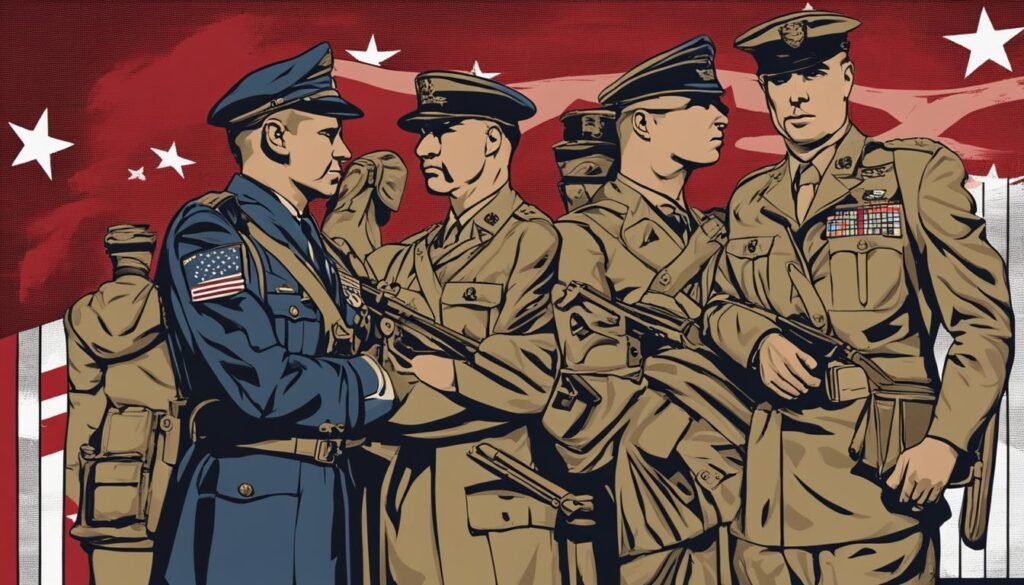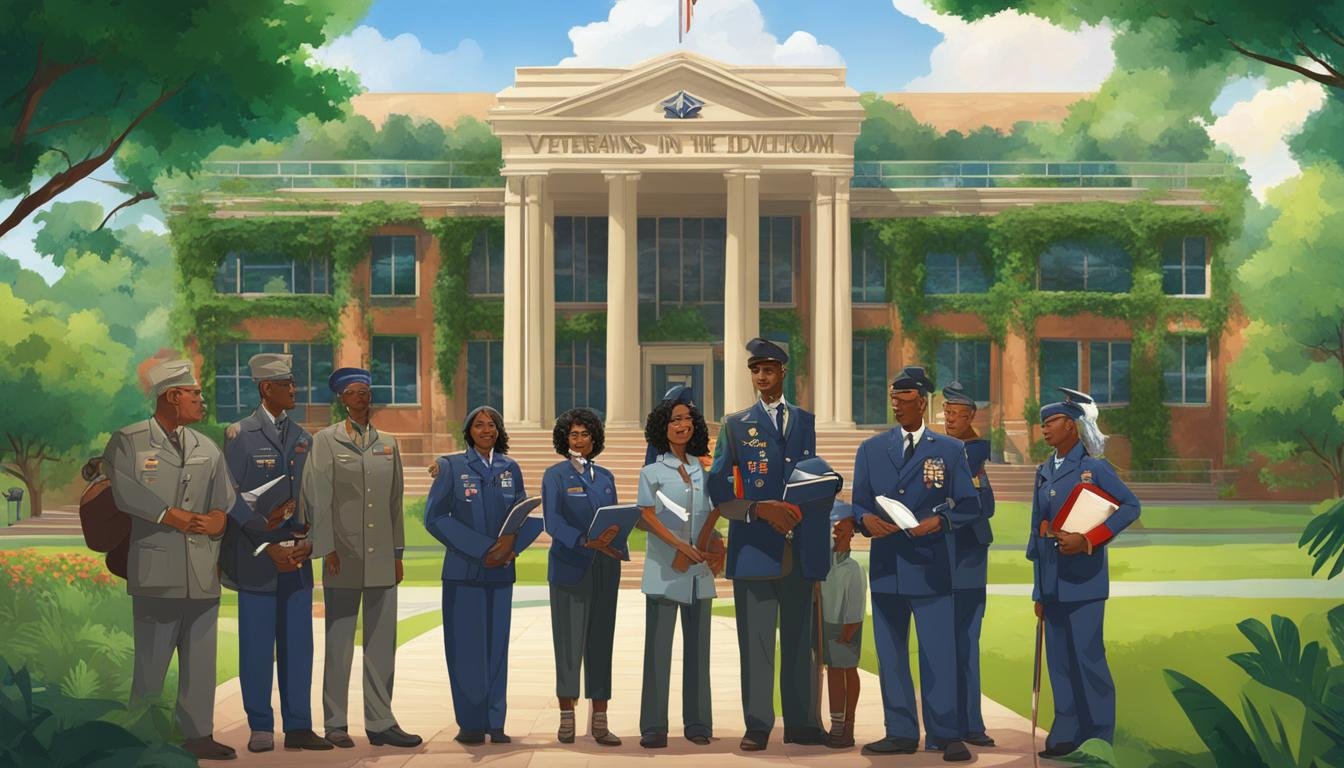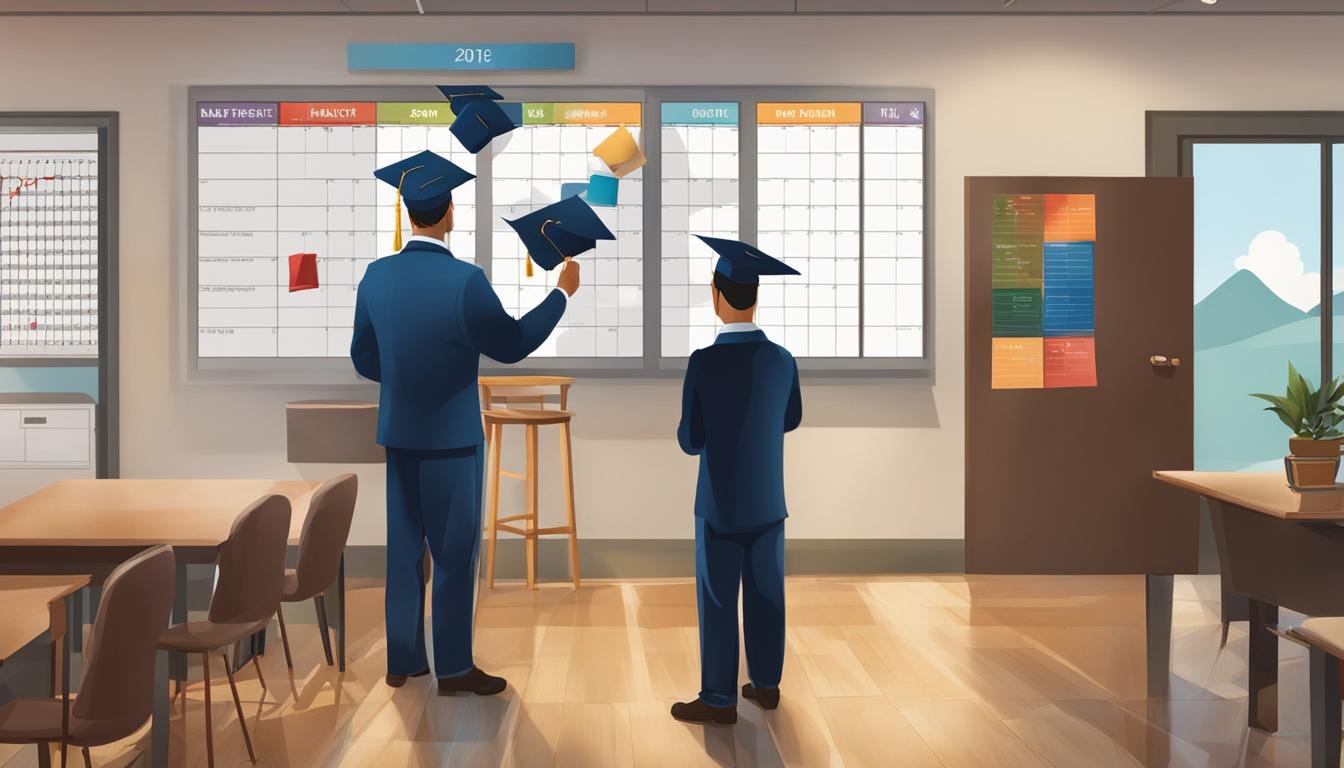Are you a veteran looking to further your education? There are several education benefits available to veterans, including the renowned GI Bill. Since 1944, the GI Bill has been assisting qualifying veterans and their family members in paying for college, graduate school, and training programs. This comprehensive program provides financial assistance to cover tuition, housing, fees, and books.
One of the advantages of the GI Bill is that it allows veterans to apply their benefits to international education opportunities. So, if you have dreams of studying abroad, the GI Bill can help make it a reality. The application process for accessing these benefits is straightforward, and additional education benefits such as priority course scheduling and in-state tuition eligibility are also available to veterans.
Key Takeaways:
- The GI Bill provides financial assistance for veterans to pursue higher education.
- Veterans can apply their benefits to international education opportunities.
- Additional education benefits include priority course scheduling and in-state tuition eligibility.
- The application process for accessing education benefits is simple.
- The GI Bill has been helping veterans since 1944.
Eligibility for GI Bill Benefits

To access the education benefits offered by the GI Bill, veterans must meet specific eligibility requirements. The process begins with submitting an application to the Department of Veterans Affairs (VA) for a formal eligibility determination. This can be done conveniently online through VA Form 22-1990. For veterans who have previously received VA education assistance, they may use VA Form 22-1995. The GI Bill website provides comprehensive information on education benefit rates, approved schools, employers, and VET TEC providers.
Basic eligibility criteria encompass a range of factors, including length of service, discharge character, and specific dates of service. Generally, veterans who have served at least 90 continuous days of active duty after September 10, 2001, or have a minimum of 30 days of continuous active duty and were discharged for a service-connected disability, are eligible for education benefits under the Post-9/11 GI Bill.
It’s important to note that eligibility requirements may vary depending on the specific GI Bill program. For instance, the Montgomery GI Bill requires a minimum service obligation and may have different eligibility criteria. Additionally, certain education benefits may be transferable to dependents and spouses of eligible veterans, providing further opportunities for educational assistance.
Comparing Veteran Education Benefit Programs

When it comes to education benefits for veterans, there are various programs to choose from. It is important to compare these programs to make the most of the available options and maximize education benefits for military families.
GI Bill
The GI Bill is one of the most well-known education benefit programs for veterans. It offers financial assistance to cover tuition, housing, fees, and books. However, it is important to note that there are different versions of the GI Bill, including the Montgomery GI Bill and the Post-9/11 GI Bill, each with its own set of eligibility requirements and benefits.
Branch-Specific Programs
Each branch of the military also offers its own scholarship and education programs. These programs often require veterans to serve in the military after graduation. For example, the Army offers the Army ROTC Scholarship, which covers tuition, fees, and a monthly allowance. The Air Force offers the Air Force ROTC Scholarship, which provides financial assistance for tuition and fees, as well as a monthly stipend. These branch-specific programs can provide additional benefits and opportunities for veterans.
Other Programs
Aside from the GI Bill and branch-specific programs, there are other education benefit programs available to veterans. For example, the Coast Guard College Student Pre-Commissioning Initiative offers full tuition, fees, and a monthly stipend for veterans interested in becoming Coast Guard officers. Additionally, some states offer their own education benefit programs, such as in-state tuition eligibility for veterans.
By comparing the rules, timing, amounts, and requirements of these different programs, veterans can make informed decisions about which program best suits their needs and goals. Maximizing education benefits for military families is crucial, as it can provide opportunities for both veterans and their children to pursue higher education and build successful careers.
| Education Benefit Program | Benefits | Eligibility |
|---|---|---|
| GI Bill | Financial assistance for tuition, housing, fees, and books | Veterans who meet specific criteria |
| Branch-Specific Programs | Additional scholarships and education opportunities | Veterans interested in serving in the military after graduation |
| Coast Guard College Student Pre-Commissioning Initiative | Full tuition, fees, and monthly stipend | Veterans interested in becoming Coast Guard officers |
| State Programs | In-state tuition eligibility | Veterans residing in specific states |
Using Veteran Education Benefits for Graduate Studies

As a veteran, you have the opportunity to use your education benefits to pursue graduate studies and further enhance your career prospects. The GI Bill provides financial assistance to cover the costs of tuition, housing, fees, and books, making it easier for you to transition into a graduate program.
When considering graduate studies, it’s important to explore the different programs available and find one that aligns with your career goals. Whether you’re interested in pursuing an advanced degree in business, engineering, healthcare, or any other field, your education benefits can help make it a reality. Research and choose a graduate program that will equip you with the skills and knowledge necessary to excel in your desired profession.
“Graduate studies offer veterans the opportunity to further their education and enhance their career prospects.”
It’s also worth noting that there are educational counseling services available specifically for veterans. These services can provide guidance and support throughout the process of applying for and utilizing your education benefits. Educational counselors can help you navigate the complexities of graduate school applications, financial aid, and selecting the right program for your career aspirations.
By using your veteran education benefits for graduate studies, you can gain a competitive edge in the job market and open doors to higher-paying positions. Take advantage of this opportunity to invest in your future and achieve your academic and professional goals.
Table: Comparison of Graduate Programs Eligible for Veteran Education Benefits
| Program | Tuition Coverage | Housing Allowance | Eligibility Requirements |
|---|---|---|---|
| MBA Program | Full tuition coverage | Based on zip code | Bachelor’s degree |
| Master of Science in Engineering | Partial tuition coverage | Based on zip code | Bachelor’s degree in a related field |
| Master of Social Work | Full tuition coverage | Based on zip code | Bachelor’s degree in a related field |
As shown in the table above, different graduate programs have varying levels of tuition coverage and eligibility requirements for veteran education benefits. It’s important to research the specific requirements and benefits of each program before making a decision. This will ensure that you choose a program that aligns with your educational goals and maximizes the benefits available to you.
Veteran Education Benefits for Vocational Training
When it comes to education benefits for veterans, it’s not just about college and graduate studies. Veterans also have the opportunity to utilize their benefits for vocational training programs. Veteran education benefits for vocational training can open doors to a variety of industries by providing practical skills and certifications that are in high demand.
Vocational training programs offer focused and hands-on learning experiences that directly prepare veterans for specific trades or professions. Whether it’s automotive technology, culinary arts, medical assisting, or construction trades, these programs provide the necessary skills and knowledge to excel in a chosen field. By utilizing their education benefits, veterans can gain a competitive edge in the job market and pursue rewarding careers that align with their interests and talents.
One of the key advantages of using veteran education benefits for vocational training is the financial support they provide. The GI Bill and other programs can help cover the costs of tuition, fees, and even provide a stipend for housing. This makes vocational training programs more accessible and affordable for veterans who may be transitioning from military service and looking to acquire new skills. It’s an opportunity to invest in their future and embark on a fulfilling career path.
It’s important to note that veteran education benefits for vocational training are not limited to traditional classroom settings. Many programs offer flexible learning options, including online courses and hands-on apprenticeships. This allows veterans to choose a learning format that best suits their needs and fits into their schedule. By providing this flexibility, veteran education benefits ensure that individuals can pursue vocational training without sacrificing their other commitments.
| Vocational Training Programs | Duration | Estimated Median Pay |
|---|---|---|
| Automotive Technology | 6-12 months | $42,090 |
| Culinary Arts | 1-2 years | $51,530 |
| Medical Assisting | 1 year | $35,850 |
| Construction Trades | 6-12 months | $47,180 |
As shown in the table above, vocational training programs can lead to promising career opportunities with competitive salaries. By leveraging their education benefits, veterans can gain the skills and qualifications needed to thrive in these fields. Whether it’s pursuing a passion or exploring a new career path, vocational training offers a viable and rewarding option for veterans looking to build a successful future.
Conclusion
Transitioning from military service to college can be made easier with the help of education benefits for veterans. These benefits, such as the GI Bill, offer financial assistance for various education opportunities, including college, graduate studies, vocational training, and even international education. By utilizing these benefits, you can open doors to higher education and acquire the necessary skills and knowledge for your desired career path.
Education benefits for veterans provide a range of opportunities to support your transition into civilian life. Whether you choose to pursue a traditional college degree or opt for vocational training, these benefits can help cover tuition, housing, fees, and books, making education more accessible. Additionally, veterans can take advantage of educational counseling services to guide them through the process of applying for and utilizing their benefits.
Maximize your future opportunities by taking advantage of the available education benefits. With the GI Bill and other programs, you can gain the education and skills needed to succeed in your desired field. Transitioning from military service to college is made easier with these benefits, allowing you to enhance your career prospects and successfully embark on a new chapter of your life.
FAQ
How long has the GI Bill been helping veterans and their family members pay for college?
The GI Bill has been providing educational assistance since 1944.
What expenses does the GI Bill cover?
The GI Bill covers tuition, housing, fees, and books.
How can veterans access GI Bill benefits?
Veterans can access GI Bill benefits by submitting an application to the Department of Veterans Affairs (VA).
Are there additional education benefits available to veterans?
Yes, veterans can also receive priority course scheduling and in-state tuition eligibility, among other benefits.
Can veterans use their benefits for international education opportunities?
Yes, veterans can apply their benefits to international education opportunities.
What criteria must veterans meet to be eligible for GI Bill benefits?
Veterans must submit an application to the VA for a formal eligibility determination.
How can veterans apply for GI Bill benefits?
Veterans can apply for GI Bill benefits online through VA Form 22-1990.
What if veterans have previously received VA education assistance?
Veterans who have previously received VA education assistance can use VA Form 22-1995.
Where can veterans find more information on education benefit rates and approved schools?
The GI Bill website provides information on education benefit rates and approved schools, employers, and VET TEC providers.
What education benefit programs are available to veterans?
Veterans have the option to choose from different education benefit programs.
Are there scholarship programs offered by each branch of the military?
Yes, each branch of the military offers its own scholarship programs, with the requirement of serving in the military after graduation.
Can veterans use their benefits for graduate studies?
Yes, the GI Bill covers the costs of tuition, housing, fees, and books for qualifying veterans pursuing graduate studies.
Is there educational counseling available to veterans?
Yes, there are educational counseling services available to veterans to help them navigate the process of applying for and utilizing their benefits.
Can veterans use their education benefits for vocational training programs?
Yes, the GI Bill can help cover the costs of vocational training programs.
What opportunities do education benefits offer transitioning veterans?
Education benefits offer transitioning veterans the opportunity to maximize future opportunities and successfully transition into civilian life with the skills and education needed for their desired career paths.



